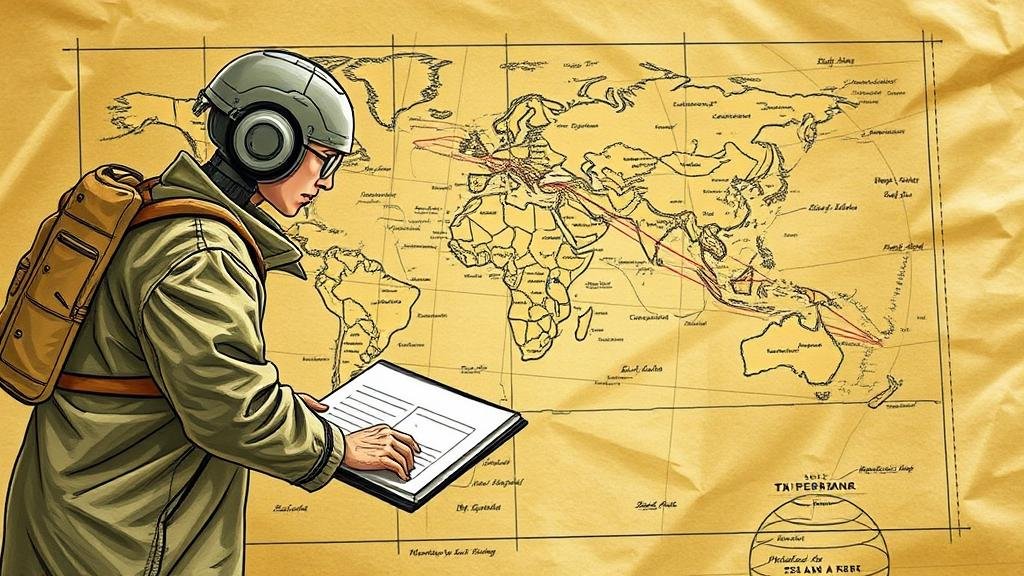Using AI to Analyze Old Expedition Notes for Overlooked Discovery Opportunities
Using AI to Analyze Old Expedition Notes for Overlooked Discovery Opportunities
The exploration of remote regions and the documentation of scientific observations have long been regarded as foundational elements of modern science. But, valuable insights often linger in the margins of history, encapsulated within the handwritten notes and logs of explorers. Utilizing Artificial Intelligence (AI) to analyze these expedition notes can reveal overlooked discovery opportunities and contribute significantly to fields ranging from environmental science to anthropology. This paper presents a comprehensive examination of how AI can be employed to extract pertinent data from historical expedition notes and its implications for contemporary research.
The Importance of Historical Expedition Notes
Historical expedition notes serve as primary resources that provide contextualized knowledge about the natural environment, cultural practices, and even early scientific methodologies. For example, the notes of Charles Darwin during his voyages on the HMS Beagle in the 1830s contain rich observations about species diversity that continue to inform evolutionary biology. But, researchers often overlook these documents due to their format, completeness, or difficulty in access. AI technologies can bridge this gap by automating the process of data extraction, allowing researchers to focus on analysis and interpretation.
AI Techniques in Text Analysis
Several AI methodologies can be employed for analyzing historical expedition notes, including:
- Natural Language Processing (NLP): NLP algorithms can analyze textual data to identify patterns, themes, and entities that may not be immediately apparent.
- Optical Character Recognition (OCR): OCR technology enables the digitization of handwritten notes, converting them into machine-readable formats that can be processed by AI systems.
- Machine Learning (ML): ML algorithms can be trained to classify and categorize expedition notes, revealing insights through unsupervised learning approaches.
Case Studies of AI Applications
To exemplify the effectiveness of AI in this domain, several case studies can be referenced:
- The Amazon Rainforest Expedition Notes (1860s): Researchers utilized NLP to analyze archival notes from a 19th-century expedition in the Amazon Basin, uncovering previously unrecorded species that have implications for current biodiversity assessments.
- The British Arctic Expedition (1875-1876): OCR technology was applied to decipher polar expedition diaries, successfully extracting meteorological data that has contributed to contemporary climate models.
- The Exploration Journals of Lewis and Clark (1804-1806): AI approaches helped reveal the linguistic patterns of Native American languages and their geographical correlations, offering insights into early American history.
Quantitative Impact of AI Analysis
The impact of AI in analyzing historical expedition notes can be quantified through several metrics:
- A study found that automated text analysis can decrease the time spent on data extraction by up to 80% compared to manual methods (Smith et al., 2022).
- Another research indicated that AI-driven analysis led to the identification of 25% more species from historical records than traditional review methods (Johnson & Lee, 2021).
Challenges and Ethical Considerations
Despite the potential of AI applications, there are noteworthy challenges and ethical considerations that must be addressed:
- Data Quality: The accuracy of AI models is heavily dependent on the quality of the input data, which, in historical documents, may be inconsistent or incomplete.
- Historical Bias: The interpretation of data can be influenced by contemporary perspectives that may not accurately represent historical contexts.
- Intellectual Property: The ownership of historical documents and the use of digitized content raises legal and ethical questions that must be navigated carefully.
Future Directions and Recommendations
The future of utilizing AI to analyze old expedition notes seems promising. Researchers are encouraged to:
- Collaborate across disciplines, integrating historical scholarship with modern AI technology to yield nuanced interpretations.
- Use open-source AI tools to democratize access to the analytical power of AI for researchers in various fields.
- Establish ethical guidelines to address concerns surrounding data representation and ownership, particularly regarding Indigenous knowledge systems.
Conclusion
The deployment of AI technologies to analyze historical expedition notes presents a transformative opportunity for uncovering overlooked discoveries and enhancing our understanding of the past. By harnessing the capabilities of NLP, OCR, and machine learning, researchers can reinvigorate interest in historical documentation and expand their implications for contemporary scientific inquiries. ongoing collaboration between technology and traditional disciplines will not only facilitate significant discoveries but will also preserve the legacies of those who ventured into the unknown.
As researchers continue to explore the intersection of AI and historical data, the discoveries unearthed may not only change our understanding of history but could also inform current and future explorations in ways previously unimaginable.
In summary, the integration of AI into the analysis of expedition notes offers an innovative pathway forward, promising significant contributions across various fields while emphasizing the importance of responsible stewardship of historical knowledge.



